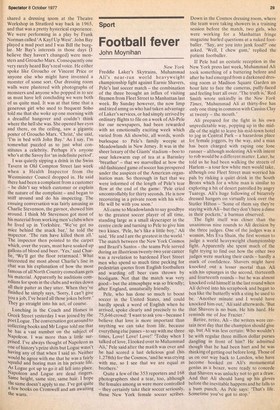Sport
Football fever
John Moynihan
New York Freddie Laker's Skytrains, Muhammad Ali's near-run world heavyweight championship fight against Earnie Shavers, Pele's last soccer match — the combination of the three brought an influx of visiting firemen from Fleet Street to Manhattan last week. By Sunday however, the now limp and tired amng us who had taken advantage of Laker's services, or had simply arrived by ordinary flights to file on a week of Ali-Pele for our newspapers, had been rewarded with an emotionally exciting week which varied from Ali showbiz, all words, words burlesque to Pele's family weepie at Meadowlands in New Jersey, It was in the sheer luxury of the Giants' stadium — boo to your lukewarm cup of tea at a Barnsley 'breather' — that we marvelled at how the old-fashioned game of soccer has prospered under the auspices of the American organisation man. So thorough in fact that we were informed of the length of Pele's tear flow at the end of the game: 'Pele cried uncontrollably for thirty seconds. He is now recovering in a private room with his wife. He will be with you soon.'
Ali came to Meadowlands to say goodbye to the greatest soccer player of all time, standing large as a small skyscraper in the centre circle and turning to Pele to give him two kisses. 'Pele, he's like a little boy,' All said. 'He and I are the greatest in the world.' The match between the New York Cosmos and Brazil's Santos — the teams Pele served during an illustrious twenty-two year career was a revelation to hardened Fleet Street men who spend so much time pecking for pedestrian quotes from English footballers and warding off beer cans thrown by hooligans. Not that the match was very good — but the atmosphere was so friendly; after England, unnaturally friendly.
Pele, who has done so much to boost soccer in the United States, and could hardly speak a word of English when he arrived, spoke clearly and precisely to the 75,646 crowd: 'I want to ask you— because I believe that love is more important than anything we can take from life, because everything else passes— to say with me three times, Love! Love! Love!' Today when I talked of love, I looked over to Muhammad Ali,' Pele said after the match was over and he had scored a last delicious goal (his 1,278th) for the Cosmos, 'and he was crying with me, so 1 see that we are equal as brothers.'
Quite a few of the 353 reporters and 168 photographers shed a tear, too, although the females among us were more controlled — they certainly take their soccer seriously, these New York female soccer scribes. Down in the Cosmos dressing room, where the team were taking showers in a training session before the match, two girls, who were working for a Manhattan fringe magazine hurled questions at a naked footballer. "Say, are you into junk food?' one asked. 'Well, I chew gum,' replied the patient footballer.
If Pele had an ecstatic reception in the New York press last week, Muhammad Ali took something of a battering before and after he had emerged from a darkened dressing room at Madison Square Garden an hour late to face the cameras, puffy-faced and feeling hurt all over. 'The truth is,' Red Smith wrote unkindly in the New York Times, 'Muhammad Ali at thirty-five has only one thing in common with Cassius Clay at twenty — the mouth.'
Ali prepared for the fight in his own unpredictable way, popping up in the middle of the night to leave his mid-town hotel to jog in Central Park — a hazardous place for female joggers, by the way, and a man has been charged with raping one lone runner — although molesting Ali with intent to rob would be a different matter. Later, he told us he had been walking the streets of Harlem — a tour few white men would take, although one Fleet Street man worried his pals by risking a quiet drink in the South Bronx which for a white man is similar to exploring a bit of desert patrolled by angry Tuaregs. Al's huge following of bizarrely dressed hangers on virtually took over the Statler Hilton — 'Some of them say they're staying with All — but they don't have a dime in their pockets,' a barman observed.
The fight itself was closer than the unanimous nine rounds to All decision by the three judges. One of the judges was a woman, Mrs Eva Shain, the first woman to judge a world heavyweight championship fight. Apparently she spent much of the fight trying to find out how the other two judges were marking their cards — hardly a mark of confidence. Shavers might have knocked out a lesser mortal than Ali with his upsurges in the second, thirteenth and fourteenth rounds — but he was almost knocked cold himself in the last round when All delved into his scrapbook and began to box like the butterfly with a sting he used to be. 'Another minute and I would have knocked him out,' Ah said afterwards. 'But that Shavers is no burn. He hits hard. He reminds me of Joe Frazier.'
Retire, retire, Ali — the writers were certain next day that the champion should give up, but All was less certain: Who wouldn't be with regular three million dollar purses dangling in front of him? He admitted though that he had been hurt and he was thinking of getting out before long. Those of us on our way back to London, who have become hooked on All's monumental genius as a boxer, were ready to concede that Shavers was unlucky not to get a draw. And that Ali should hang up his gloves before the inevitable happens and he falls to a bum punch. As Pele says: 'That's life. Sometime you've got to stop.'


































 Previous page
Previous page